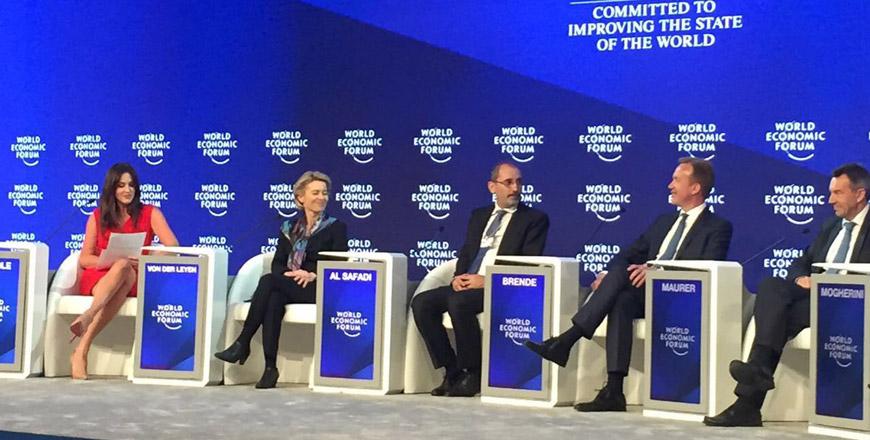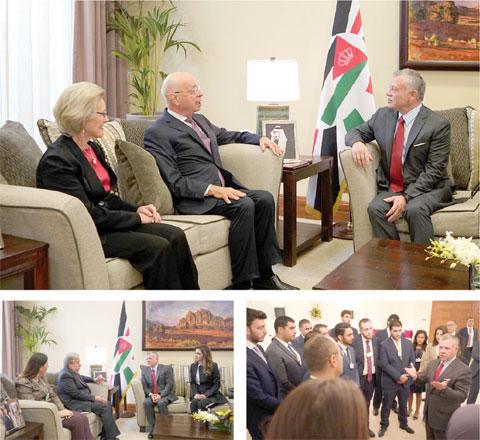You are here
Safadi urges holistic approach to region’s problems
By JT - May 20,2017 - Last updated at May 20,2017

Foreign Minister Ayman Safadi speaks during a panel on ‘Rebuilding for Peace, Middle East Stability’ as part of the World Economic Forum on the Middle East and North Africa at the Dead Sea on Saturday (Photo courtesy of WEF)
AMMAN — Foreign Minister Ayman Safadi on Saturday urged adopting a holistic approach to resolve the wider problems of the Middle East.
Speaking at a panel on “Rebuilding for Peace, Middle East Stability” as part of the functions of the World Economic Forum (WEF) on the Middle East and North Africa, Safadi said it is “about time that we saw the problems of the region within a broader picture and not just be looking at things from the perspective of silos…to see the interconnectedness of the whole problems”.
“We need to fight Daesh, obviously; we need to eliminate that threat, it is a threat to all of us, [but] the question is how do we do that?” he asked, stressing that the key to success is to be able to have a holistic approach to the problem, “holistic geographically and holistic in terms of areas that enable Daesh and the likes of which to thrive and prosper”.
“Geographically, if we do not get Daesh in Syria and we do not get them in Iraq, we haven’t done much because they are going to move to Iraq then Libya then to Somalia and others.”
The holistic approach also means that Daesh is fought at the military and security levels, but, more importantly, “ we counter it [as a] cultural and the ideological threat.
“And that we do by deconstructing the environment of despair, anger, bitterness and ignorance which enabled Daesh to thrive and to recruit,” said Safadi at the panel discussion that brought together Ursula von der Leyen, federal minister of defence of Germany, Minister of Foreign Affairs of Norway Børge Brende, Federica Mogherini, high representative of the European Union for foreign affairs and security policy, and vice president of the European Commission and Peter Maurer, president of the International Committee of the Red Cross.
Safadi added: “We are hopeful that once again we are seeing everybody, the whole world … focusing on the Middle East, realising that there are serious problems that need to be addressed. We need to look at governance; we need to look at economic opportunity, social horizon...”.
On the stability of the Middle East, the top diplomat said that it would not be achieved “without addressing the Israeli-Palestinian conflict. You cannot speak of a stable Middle East without having inclusive regimes where all peoples of a state feel that the government represents them, and you cannot speak of a stable Middle East where the youth populations do not see a future, do not see an opportunity looking forward”.
He concluded that “the challenge is upon all of us to be able to articulate plans that can deliver and not lose interest the day after. That is where we have gone wrong in the past and I hope we will not go wrong this time again and that we have learned our lessons”.
The panellists agreed that it is important to create a culture of hope rather than one of despair, and young people are critical to the process, according to a WEF statement.
The German defence minister noted that the US has said it is accelerating the campaign against Daesh. “If we want to be successful, we must defeat Daesh.” However, she said, using military means in Syria and the region will “never be sustainable”. “The path to sustainability lies in reconstruction, reconciliation and good governance,” she agreed.
Brende pointed out that the Syrian war is a complete humanitarian disaster, urging US President Donald Trump to have “constructive discussions” with Russia and to strengthen the momentum for a two-state solution to the Israeli-Palestinian conflict. The US has trust in Israel and “can build bridges”, he said.
Mogherini said the EU has “opened channels” with the Trump administration and has “built an amazing world order since the Second World War based on win-win”, she said, adding that there are regional issues where the EU and the US can work together — especially on Syria.
There must be a “big plan for the reconstruction of Syria”, economically, socially and physically. The amount of money needed will be huge, the EU official said. But reconstruction must also extend to building trust, respecting diversity and creating the ability to work together.
Maurer said “We cannot put small band-aids on big wounds.” To fix the problems of the region, there has to be political engagement by the major powers, he added. “Otherwise we will go into a downward spiral. There has to be willingness across the region to work with others,” he said. The region possesses the “necessary rules and principles, but there needs to be concrete political willingness to stop the bloodshed”. The fear is that “we have waited too long to find political solutions”.
Related Articles
AMMAN — Foreign Minister Ayman Safadi on Wednesday participated in the meeting that brought together representatives of 68 member countries
The unprecedented flow of refugees is putting an equally unprecedented strain on the economies and infrastructures of host countries like Jordan, Lebanon and Turkey with respective political consequences, the International Committee of the Red Cross (ICRC) said Thursday.
AMMAN — His Majesty King Abdullah on Saturday met with various heads of state, leading businesspeople and representatives on the sidelines o












